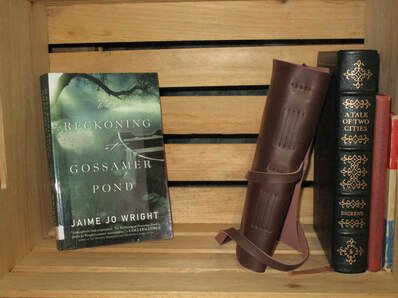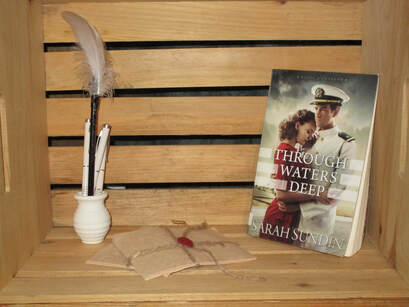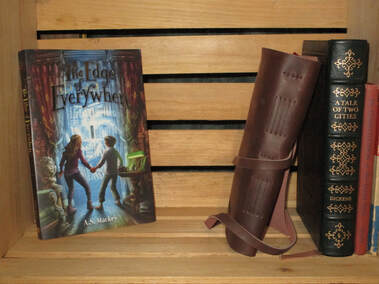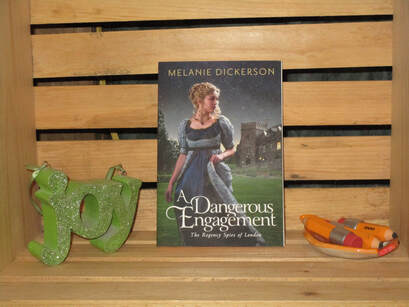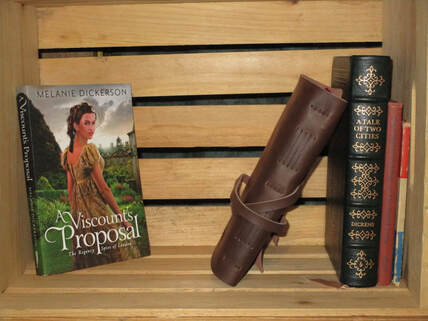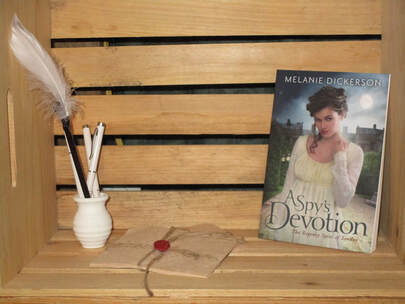|
Someone knows everything about Gossamer Grove. Everything.
And not just where you can get the best burger, or all the tourist attractions, or the best place to stay the night. Someone knows all Gossamer Grove's secrets. Everything that the residents have tried to keep hidden. And they are punishing accordingly. The message of this book surprised me, and the creativity used to bring out the message even more. Sure, it may look like a dark suspense novel. But it's actually a story about grace--and what grace is not. In its own unique way, The Reckoning at Gossamer Pond gives us both. The characters and their weaknesses (particularly the women) might be annoying to some. I found their weaknesses realistic, but not overpowering. And the fact that they can overpower their weaknesses when needed solves that. The novel goes back and forth between past secrets and present secrets. The connections between the two plots, between the two main characters are intriguing. But when it comes to endings, the past takes the prize. There just didn't seem to be a lot of evidence leading up to the present ending, whereas with the past scenario I could look back and go, "Oh, now I see it." While the past gets the ending, what it did not get was the romantic interest. I'm really not huge on romantic interests anyway, but I actually found the romantic interest in this book a little on the weird and creepy side. (Not creepy as in evil creepy, just creepy as in ack creepy.) With all that in mind, a visit to Gossamer Grove might not be a terrible idea after all.
0 Comments
Chaos always seems to find the people who don't want to be in the spotlight.
Like Mary Stirling, who suffers from a perpetual case of stage fright. Or Jim Avery, who'd rather just float with the current of events like he's done for years. Makes perfect sense that cases of sabotage would find them. I found it very interesting that the author chose to have both Mary and Jim's fears stem from events that happened when they were children. It is so true that events that happen when we're kids--good or bad, even small events--stick with us more than others. Even more interesting is the way that this book shows those characters facing their fears . . . and along the way, shows us that our fears can be overcome as well. I love how it shows the characters making the hard choices, which is something a lot of books shy away from. This is the perfect historical book. Not completely focused on the romance side. Not too slow. The good old-fashioned mystery keeps rolling forward with the romance coming in every now and then, instead of dominating the helm. I look forward to reading the rest of the trilogy as soon as I can get back to the library! Piper really does have it rough.
Her dad's been missing for years. Her mom died in a car accident. Now she and her younger brother Phoenix have been sent to live with Aunt Beryl, whom they barely know, except for this: She hates libraries. Hates them with a passion, even though she has the most beautiful one of all. They remind her too much of some great sadness in her past. Her first thing to do when the children arrive? A long list of rules of where they may and may not go. If it weren't for Aunt Beryl's butler and cook, there might not be any hope at all. Oh, and that mysterious book in the library that keeps calling their names. No, literally. Calling their names. I read this book to screen it for my younger siblings, and truthfully, we need more adult and young adult books like this. It's a different look at fantasy in the piles of fantasy novels that come out every year. It's a creative look at God that brings it down to a child's wonder and imagination. Each chapter begins with the best little bookish quote--not to mention the references to favorite books scattered throughout. What could be better than a book that introduces kids to literature? Not to mention this book has a most interesting narrator--a book! Talk about creative! (I mean, really, have you ever read a book narrated by a book? That's what I thought.) But not everything is fun and games. This book doesn't think kids are too young to deal with some tough topics. The book deals with grief and it deals with it in a very real sense--I actually felt sad after reading it. But it doesn't just describe it, it offers hope. It also deals with topics like autism and dyslexia. My family has first-hand experience with both and the way this book handled it was refreshing, truthful, and practical. The book has been kid-tested, too. My younger sister read it and I have not seen her that involved in a book in a long time. Honestly, my only complaint about this book is that it doesn't look like it will be a series. Buy a copy for a middle-grader in your life. Buy a copy for yourself. Find a tree to climb up in and read. And get closer to the God Who is everywhere, everywhen. What would you do if you found out you were engaged to a murderer?
What if you found out your fiance was part of a plot to overthrow England? What if you found out he wasn't beneath killing to help that plot succeed? What if you found out he's wholly devoted to your aunt, who's running the scheme? And what if that fiance was still madly in love with you? Welcome to the world of Felicity Mayson. This was the best novel in the Regency Spies of London trilogy in my opinion. The villains especially stand strong, particularly Lady Blackstone as a lady villain . . . although one has to admit, a bit lackwitted . . . in real life, the heroes likely would not have escaped those situations that easily. Still, it's those situations that give the story its ups and downs. Felicity's weakness and lack of being able to think for herself in a tense situation were a bit annoying, but it does make a point--sometimes in our weaknesses, we are the most strong. Still, I would have liked to have seen a bit stronger female lead at the helm. In my opinion, the best part was the transformation of Felicity's Aunt Agnes from an anxious woman who'd rather hide in a corner with a book to a woman who would stand up to spies. The entire story is based on a lie. Both Felicity and the spy Philip lie about any subject in the book--most notably, the fact that Felicity lies to her fiance so she can spy on him. But their lies are all to help England and to save lives, so is it really wrong? That's the question this story presents, and it seems to promote the idea that it's the motive that counts. Readers may agree or disagree. Like the first installment in the series, there is little Christian theme. One thread from the first chapter is still left hanging by the end of the book. (SPOILER) Also, the villains, continuing a pattern from the first three books, are never really brought to justice. They just kind of run off never to be heard from again. While this type of ending can be done well, it felt like it was done in these books just to avoid dealing with some hard topics and situations. A dangerous engagement? Perhaps. But a dangerous read? I'd say not. Leorah Langdon has really done it this time.
As if insulting the viscount at that ball wasn't bad enough. She had to fall off her horse and injure her wrist right in front of his carriage? And she had to be there when his carriage wrecked, making them both the target of all of London's rumors? And did the carriage wreck really have to be sabotage? The second book in the Regency Spies of London series actually has absolutely nothing to do with spies. Despite that misnomer, A Viscount's Proposal has a few steps up on its first installment, including more vibrant characters, less prose, and more Christian theme and character growth throughout the book. I was particularly intrigued by Leorah's motivation--that she's not the selfish girl all of society deems her to be. She's empty and searching for someone to love her, something she hasn't experienced all that much. This book particularly brought society of that time period to light. Often I'd find myself shaking my head and laughing at how ridiculous their rules were. They are portrayed vividly and clearly. There is one instance where a character uses God's name in a manner that leaves us unsure whether it was a prayer or a curse. A Viscount's Proposal? If you're referring to a proposal to spend a couple hours reading this book, I don't think that would be so bad. Julia Grey really doesn't need this spy business on her hands right now.
She's already quite busy with fending off her unkind aunt and uncle, making her cousin Phoebe feel and look good, and trying to match up said cousin with a man she secretly admires. No, Julia Grey doesn't need Nicholas Langdon complicating matters with his secret diary and spying nonsense. A Spy's Devotion is the first book in the Regency Spies of London series. Despite its name, little of the plot actually has to do with spying at all. The spying is actually a side plot, with Julia and Nicholas' attraction taking front and center stage. The beginning of the book is a bit prose-y, very heavy on description and very little on character development or action. We're told things in explanatory paragraphs that we could have been told through action or dialogue. Scenes that would have been helpful to the plot are also summed up in descriptive paragraphs as well. As a result, many of the characters are rather flat or just stereotypical. I found Julia to be a bit bland, most especially at the beginning of the story. I couldn't get a handle on what was making her react the way she was. Sometimes, she'd be cool and collected, and other times she'd completely blow her top. Later, we discover her mildness was a way of earning the approval she so desperately craves. As she overcomes this thought pattern, she becomes both a better person and a better character. Nicholas's point of view, on the other hand, seems awkward and forced at some points. The story really could have been told just from Julia's point of view. We learn nothing from Nicholas's point of view that we don't learn elsewhere. The book does have a very fairy tale feel, and fans of Cinderella stories will probably enjoy it. The message of the story is a little murky and seems a bit tacked on, once again, through descriptive paragraphs, instead of having the character's journey illustrate it. To sum up? A Spy's Devotion isn't a bad read by any stretch. It's just not one I would turn to for a thought-provoking read or one that will draw me into its world. |
Rachel's Reads
Hi there! Rachel again. Check out this section for book reviews and cover reveals of some of my favorites! Archives
June 2023
Categories
All
|
